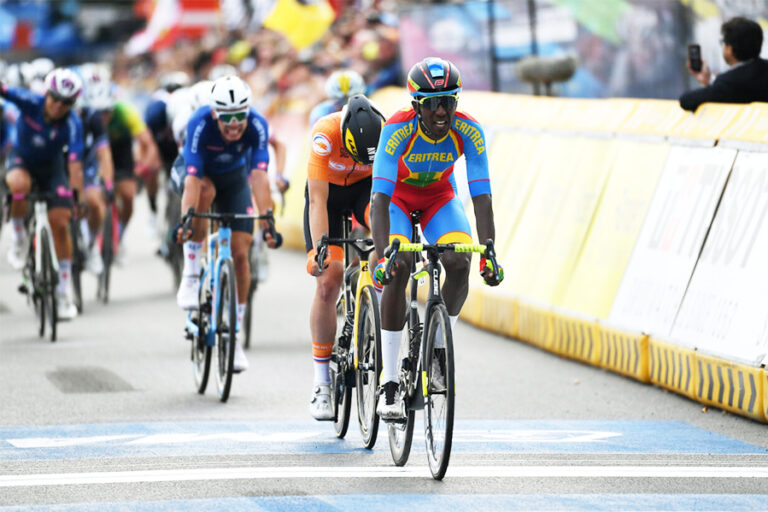Ethiopia beat Rwanda in FIFA U20 Women’s World Cup Qualifiers with 4-0 goal. Rediet Asresahegn, Aregash Kalsa and Turist Lemma scored the goals. According to Ethiopian Football Federation, the Women’s World Cup Cost Arica 2022 games have been finalized.
Helen Yemane
Name: Helen Yemane
Education: 12+
Company name: Webet design
Title: Co-owner
Founded in: 2019
What it does: Make different kinds of cultural designs
HQ: Addis Ababa
Number of employees: 4
Startup Capital: 30,000 birr
Current capital: Growing
Reasons for starting the business: To have our own job and be financially independent
Biggest perk of ownership: Financial freedom
Biggest strength: Talent in designing
Biggest challenging: Working with groups especially when there is different life perspectives
Plan: To expand our business, and open branches
First career: Hair dresser
Most interested in meeting: Zenash Tayachew /the first leady/
Most admired person: My partner
Stress reducer: Praying
Favorite past time: Designing
Favorite book: Bible
Favorite destination: Paris
Favorite automobile: Jeep
Market consumers in the global economy
The newly emerged middle class are trailblazers in their own nations and represent, on a massive scale, agents of global economic transformation. Their effect on the global economy is already starkly apparent in the seismic shift in global economic gravity over the past few decades.
Due to a myriad of factors, greater trade and investment flows, urbanization, expanding labor forces, rising wages, infrastructure spending, rising life expectancies, political stability, prudent macroeconomic management and, of course, the emerging middle classes of many developing nations, the world has been turned upside down. As recently as 1980, the world economy beat to the tune of the United States in particular and the developed economies in general. The West towered over the Rest.
But, currently the tables have turned. According to the International Monetary Fund, where the developing nations accounted for roughly one-third of world GDP in 1980, this cohort now accounts for over 55% of the global total, with China, the world’s second largest economy, leading the way. By pumping millions of new workers into the global labor force over the past three decades, China and other developing nations have dealt both a supply-side shock (more workers) and demand-side shock (more consumers) to the world economy.
Much of the economic narrative over the past few years has been focused on the former, notably in many developed nations, the United States included, where the common refrain is that the rising supply of workers in the developing nations has undermined the jobs and incomes of workers in the West. To a degree, this is true, although many empirical studies suggest that more United States jobs have been lost to automation and technological advances than to low-cost labor in Mexico or China. The more salient point is that the millions of workers in the emerging markets are also consumers, with more disposable income than their parents or grandparents ever had.
While the spending power of the West has been diminished by the United States-led financial crisis and ensuing austerity in Euro zone area of the European Union, the purchasing power among developing consumers is on a secular upswing. Where in the past factory workers in Asia would trudge off to work on Saturday morning, today they are more likely to head for the local shopping malls for a day of socialising and shopping.
Any first-time visitor to the emerging cities of Shanghai, Dubai, Mumbai, Ho Chi Minh City, Istanbul and Sao Paulo is struck by the vigor and vitality of the local consumer, out in force and shopping in an air-conditioned mall that might be mistaken for a mall in suburban America. The size and scale of these urban buyers and their pent-up demand for electronic goods, appliances, automobiles, skin-care products, clothing and other goods are increasingly setting global trends. Emerging market consumers are leading in global fashion and driving global sales in a number of industries.
Indeed, in a seminal shift, global consumption is tilting toward the developing nations and away from the United States and the West. According to both the recent UNDP and IMF documents, the gap in global personal consumption is narrowing in favor of the developing nations. Where the spread was roughly 80:20 in favor of the developed nations in 1980, the spread has now narrowed to roughly 60:40. And the will have little doubt that in the not-too-distant future, the lines will cross, with the newly emerging middle class poised to take the global baton of consumption from consumers in the West.
And as the emerging market middle classes consume more, world trade flows are being altered. According to the IMF, a shift in world imports is well under way, with the developing nations’ share of world imports reaching a record 56% last year, totalling a record $10.5 trillion. Again, in just a matter of years, the lines are set to cross and imports from the developing nations, led by rising purchases of goods and services from the middle class are set to easily supersede those of the developed nations.
The aftershocks from the rise of the middle class in the developing nations are evident in various guises. Their pent-up demand for electronic goods, appliances, automobiles, skincare products, clothing and other goods has reached the point where emerging market consumers are now dictating the global revenues and profitability of these industries and others.
In addition, as the new global consuming class adopts and acquires Western lifestyles, moves from the village to the city, works in air-conditioned offices, drives to work, consumes more protein, there will be greater demand and higher prices for energy, water, agricultural goods and other natural resources. Put in another way, the monopoly the West has long enjoyed in devouring the world’s natural resources is over.
For much of the post-Cold War era, the equation was rather simple. The developing nations produced commodities and the West consumed them. Those days however, are past. Millions of the new middle class consumers are pressuring the global commodity infrastructure. There is a dramatic shift in underlying demand for global energy, with the developing nations clearly now the global drivers of energy demand and prices.
According to the IMF, the same holds true for the global consumption of meat, fruits and vegetables, with the developing nations, driven by a more affluent emerging market consumer, already out-consuming the developed nations. Pick virtually any commodity and the story is basically the same. Copper, silver, iron ore, meat, corn, wheat, soybeans, the future price of these commodities and others will increasingly reflect the rising per capita incomes and attendant jump in consumption among consumers in the developing nations. In the end, the world has changed. In the years ahead, the global economy will increasingly beat to the tune of millions of other middle-class consumers.






